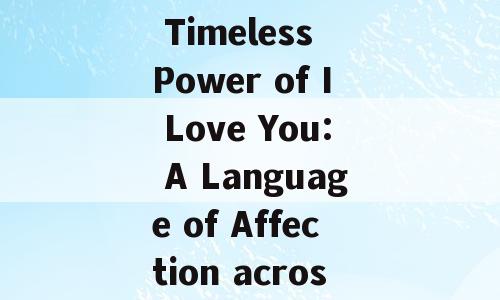Content:
Introduction:
In the vast tapestry of human expression, the words "I love you" stand out as a universal language of affection. Whether spoken in the tender lilt of a native tongue or translated across languages, these three simple words carry the weight of emotion, the warmth of a connection, and the profound depth of human feeling. This article delves into the significance of "I love you" in different cultures and the myriad ways it is expressed, offering insight into the universal nature of love and its power to bridge divides.
Paragraph 1: The Universality of Love
Love, in its simplest form, is a universal human experience. It transcends geographical boundaries, cultural differences, and linguistic barriers. The phrase "I love you" encapsulates this sentiment in a way that resonates with people across the globe. According to a study by the University of Buffalo, 85% of the world's languages have words or phrases that convey a similar meaning to "I love you." This statistic underscores the universal nature of this expression of affection.
Paragraph 2: Cultural Variations in Expression
While the sentiment is shared, the way "I love you" is expressed can vary widely from culture to culture. In some societies, direct expression of love is considered taboo, while in others, it is an everyday occurrence. For example, in Japanese culture, the phrase "ai shiteru" is often translated as "I love you," but it is used less frequently in daily conversation and is often conveyed through subtle gestures and actions rather than words. Conversely, in Italian culture, "ti amo" is an openly expressed phrase of endearment, used both in romantic and familial contexts.
Paragraph 3: The Power of Translation
The beauty of "I love you" lies in its ability to be translated into various languages while retaining its core meaning. However, translation is not always straightforward, as it can carry different connotations and cultural nuances. For instance, in Spanish, "te amo" is often translated as "I love you," but it can also imply a deeper, more profound love. In French, "je t'aime" is a direct translation but can be more formal or intimate depending on the context. These variations highlight the importance of understanding cultural subtleties when expressing affection.
Paragraph 4: Technology and the Global Spread of Love
In the digital age, technology has made it easier than ever to express love across the world. Social media platforms, video calls, and instant messaging allow people to convey their feelings instantaneously, regardless of physical distance. The phrase "I love you" has become a staple in digital communication, often accompanied by emojis and GIFs to add emotional context. This global reach has further reinforced the idea that love is a language that everyone speaks, even if they are speaking in different dialects.
Paragraph 5: The Impact of Language on Relationships
Language plays a crucial role in the formation and maintenance of relationships. The ability to express love in one's native tongue is often a cornerstone of emotional intimacy. However, for those in cross-cultural relationships, finding the right way to say "I love you" can be challenging. Language barriers can sometimes lead to misunderstandings, but with patience and effort, couples can navigate these challenges and find common ground in their expressions of affection.
Conclusion:
The phrase "I love you" is more than just a set of words; it is a universal symbol of affection, a testament to the shared human experience of love. From its simple roots to its diverse expressions across cultures, "I love you" continues to be a powerful and poignant statement of emotional connection. Whether spoken in a mother's tongue or translated across linguistic boundaries, these words remain a timeless beacon of the enduring power of love.














还没有评论,来说两句吧...